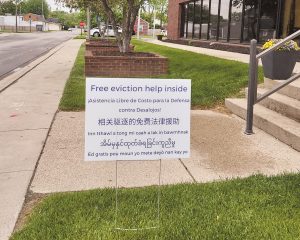Subscriber Benefit
As a subscriber you can listen to articles at work, in the car, or while you work out. Subscribe NowEven before Judge Kimberly Bacon stepped onto the bench to begin the morning session, the building that houses the Lawrence Township Small Claims Court in Marion County was getting crowded.
People were standing in the hallway, sitting on black plastic chairs or silently drifting into the courtroom. Meanwhile, court staff and legal aid attorneys were settling into an oversized conference room, plugging in their laptops and organizing their materials.
The recent activity was just one indication of the court’s different approach to evictions.
Every Wednesday and Thursday, the docket is filled with landlord-tenant cases. But since October 2021, Lawrence Township has been implementing a housing court model that provides additional services to try to prevent or lessen the impact of the loss of a place to live.
Bacon acknowledged the housing court alters the judiciary’s role a little bit, but she said she sees the approach as another opportunity for the court to give plaintiffs and defendants answers.
“It’s good to be able to preside over the court and say, ‘Here, you’ve got some options,’” Bacon said. “… For so long, eviction courts were places where you could come in and be in and out in 15 minutes. Does my process take longer? Absolutely. But do you walk away with a whole lot more information and an ability to get right? Absolutely.”
Lawrence Township’s budding housing court was highlighted as a best practice in the final report by the Indiana Eviction Task Force. Convened from the Indiana Supreme Court in 2021, the task force was charged with suggesting steps for establishing a pre-eviction diversion program that would allow for quicker distribution of the emergency rental assistance funds for tenants who are behind on rent.
The task force’s two recommendations align with the work of the housing court.
In particular, the task force called for clarifying some parts of the diversion program that might encourage more landlords and tenants to participate. Also, the group recommended the eviction process begin with an initial hearing to give the parties information about resources available to mitigate the eviction.
The Lawrence Township court has a facilitator available to sit with the parties and try to reach an agreement for payment of past due rent or for other issues. Also, a navigator helps tenants apply for emergency rental assistance funds. Legal aid attorneys and students from Indiana University Robert H. McKinney School of Law provide guidance to the tenants who are usually unrepresented in the eviction hearings.
“I’ve been very impressed,” task force chair and Court of Appeals of Indiana Judge Robert Altice said of Bacon. “She’s really taking the bull by the horns and is doing some really innovative stuff.”
Stopping the cycle
Most of the cases coming before Bacon on a recent Wednesday were for nonpayment of rent, with some tenants owing as much as $4,000 or more.
Every tenant was allowed to review the accounting ledger tabulating the arrearage and then asked to either admit or deny that the amount was correct. Several of the renters told the court they were in the process of getting the money, while the landlords replied they did not believe the tenants would be able to pay past due rent.

Bacon granted many of the orders to vacate but explained to the tenants that if they fulfilled their financial obligations by the move-out date, the case would be dismissed. In addition, she advised the tenants to take photos and videos if they did have to move out so they would have something to show the court should the property owner seek damages.
Also, she told the tenants who were able to pay the arrearage to check with the legal aid attorneys and contact credit reporting agencies to see about removing the eviction filing from their records.
The idea for the housing court had been percolating for a couple of years, but the arrival of COVID-19 provided the opening to try something different. Bacon said the goal of the initiative was to interrupt the cycle of poverty that can be started by an eviction.
Compounding the crisis have been the tenants who had been working and paying their bills but got caught in the pandemic’s economic disruption and, for the first time, found themselves unable to pay their rent. Bacon and her team are building a program that tries to mitigate the impact of the eviction and help connect tenants and landlords to other services in the local community.

A resident of Lawrence Township, Bacon said she sees what she considers the benefit of housing court when she is presiding in her courtroom as well as when she is at the grocery store and someone who appeared in her court says hello.
“I believe it’s successful … because we are offering on-site services that allow people to have unresolved issues and questions answered,” Bacon said. “… In an otherwise acrimonious environment, we open the door for conversation and for assistance, because if people are able to pay and stay, it has an impact on their ability to keep a roof over their head, maintain their jobs, keep their children in school, be able to buy food for their household and hopefully stabilize the communities so the crime rates will even go down.”
However, not everyone likes the program.
Donald Johnson, a property owner, asserted the housing court was enabling tenants to continue procrastinating. He blamed the government’s response to the pandemic with fueling the need to evict, noting that as the moratoriums on utility payments have been lifted, tenants are shuffling rent money to cover their electric and gas bills, which have gone unpaid for months.
Dressed in a tracksuit and wearing a T-shirt emblazoned with a food pantry logo, Johnson said he was also frustrated by the negative stereotype attached to landlords. He scrolled through the pictures on his phone and talked about spending seven hours helping a tenant move out because none of the woman’s relatives came to assist her.
Then he pointed out that evictions are the result of larger societal problems all starting with the breakdown of the family. He became emotional as he described the woman tenant who was struggling, in part, because her children and grandchildren were not caring for her.
“Families should take care of family no matter what,” Johnson said. “If their relative has physical problems or mental health problems, they should still show up.”
Seeing a benefit
As the housing court’s facilitator, attorney Pat Chavis has negotiated agreements between landlords and tenants who sometimes feud like families. The goal when the parties step into his office in the back of the courtroom, he said, is to “stop the bleeding” by working out an agreement for either payment or voluntary move out.
Often, he said, the opposing sides have not been communicating. Just starting the conversation can lead to the parties making an arrangement on their own so they do not have to ask the court to resolve their differences.
Bacon said she is hopeful the housing court sparks a wider conversation among judges who will implement the program in their own jurisdictions.
“I have a passion for it,” Bacon said of housing court. “We’re going to make this work and hopefully … the state judiciary as a whole will be able to find something in this model they like and that they can use.”•
Please enable JavaScript to view this content.
